Friday 2nd July
David Douglas wrote to Arthur Bell from Hill 60:
We have been up here now for about six weeks. […] It is one of the worst trenches in the firing line, just a big graveyard. This is where the French lost 500 men, and the smell is sickening. They call the place we are holding “Murder Hill”, and it is well named.
At a six-monthly meeting of the Langholm and District Savings Bank, it was reported that deposits have been increasing, despite current circumstances.
Ford Mill paid a war bonus to employees: £1 to men, 10 shillings to women and 5 shillings to girls.
Sunday 4th July
Private T G Elliot, 1/5th KOSB, wrote to Richard Beattie, Henry Street, describing some of his Dardanelles experiences and the climate. ‘It is rather warm weather here’, he said, ‘and I only wish Pelosi was here about mid-day.’ Luigi Pelosi had an ice-cream shop and a street vending cart in Langholm.
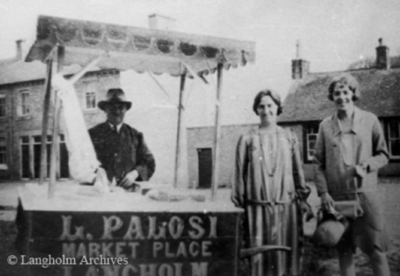
Wednesday 7th July
The KOSB is the only regiment allowed to have bayonets fixed and flags flying when marching through Edinburgh. The 15th Battalion Royal Scots has requested the same privilege, which is under consideration by the Lord Provost of Edinburgh.
A Scottish terrier has installed itself at the Red Cross Hospital and follows anyone in khaki around, but ignores civilians.
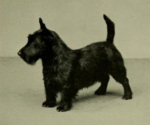
Friday 9th July
Eleanor Bell, wife of Major Edward Bell, committed suicide in her home Clinthead, aged 42. Her death certificate gives the cause of death as ‘Carbolic acid poisoning (suicidal) Shock’. Carbolic acid is a domestic disinfectant. The certifying medical attendant was Dr Alex Calwell, one of the town’s general practitioners, who has been staying with the Bell family since his arrival in Langholm last year.
It is not evident what triggered Eleanor’s action. She had possibly heard a rumour about her husband Edward’s death, although as of today he has not even been injured [but see diary for 12th July]. She leaves two sons and two daughters, aged four to 15; another son died in infancy in 1902.
German South West Africa has surrendered after being defeated by a South African force led by Louis Botha and Jan Smuts.
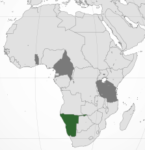
Mrs Matilda Scott-Elliot, wife of East India merchant and theosophist William Scott-Elliot, had several thousand pounds worth of jewellery stolen from the guard’s van of the Edinburgh to Aberdeen train. The Scott-Elliots own Arkleton, a property five miles north of Langholm. Admiralty war regulations require passengers crossing the Forth Bridge to hand over belongings to railway officials until trains have crossed the bridge. The theft was discovered when belongings were being returned.
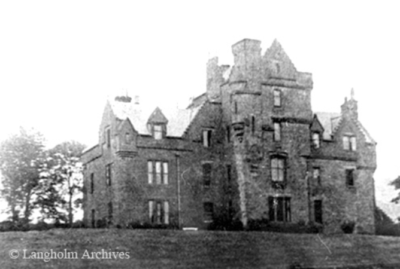
Sunday 11th July
At the close of the North UF Church service, Rev George Orr spoke about William Ramage’s death:
It melts the heart to picture these dear Langholm lads, and especially his brother John, standing sadly round the grave of the first to fall of the Langholm Territorials. […] The character of William Ramage is known to us all. As a congregation we saw every week, for years, his exceeding faithfulness and helpfulness in the church choir. All who had the slightest acquaintance with him knew him to be a most kindly, even-tempered, four-square, well-principled, sterling man.
Monday 12th July
John Warwick, a bugler with 1/5th KOSB and the son of a weaver, was killed in action in the Battle of Achi Baba Nullah in Gallipoli, aged 19. He was a member of the Town Band and worked at the Buccleuch Estates plant nursery.
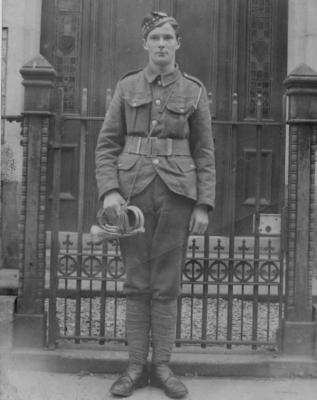
Major Bell was hit in the chest by shrapnel or a bullet, just missing his left lung, also in the Battle of Achi Baba Nullah. He lay in no-man’s land until he was carried back to British trenches and then taken to a dressing station by his batman William Murray, probably saving his life.
A public meeting was held about the Common Riding in response to the controversy generated by its cancellation. Provost Easton read out a request sent to him by 17 signatories for a meeting to rescind the cancellation and to propose: 1) to ride the marches as usual; 2) to hold the children’s procession; 3) to form a committee to make all necessary arrangements; and 4) to elect a cornet.
He declined to chair the meeting and Rev James Buchanan was elected as chairman, much to the reverend’s surprise. All four proposals were put to the meeting and were carried overwhelmingly. A committee and a cornet were elected, the cornet being John Wilson, baker, continuing the role from last year.
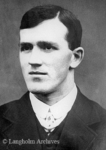
Tuesday 13th July
Rev James Buchanan sent a letter to the E&L incorporating the speech that he would have given, if he had known he was going to be chairman, in support of holding the Common Riding in a reduced form.
Several Langholm 1/5th KOSB soldiers have been wounded in the Battle of Achi Baba Nullah, including John Ramage, son of Robert and brother of William, and Thomas Turner, son of James Turner, shoemaker.
Three others in the 1/5th KOSB are ill: Thomas Roddick, son of George, butcher; Richard Beattie, son of Alexander, dyer then labourer; and James Armstrong, son of Alexander, woollen scourer.
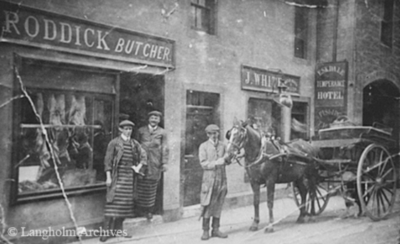
Mrs Amelia Herries received a telegram saying that her son David has been reported as being dangerously ill in Egypt. Her husband is William Herries, baker, who gave a talk about the YMCA last month.
There is an infestation of chub in the Esk and Liddle rivers. Water bailiffs have removed 542 of them in the last three days.

Wednesday 14th July
The E&L has heard that the 1/5th KOSB was heavily engaged from 19th June, with considerable losses by at least one company. It continues: ‘Rumour has greatly exaggerated these, however, and a good deal of unnecessary anxiety has been caused to those who have relatives and friends serving with the battalion.’ This may include a reference to the suicide of Major Edward Bell’s wife, Eleanor.
A poem by Christopher Grieve [later Hugh MacDiarmid] was published in the E&L today, in three parts: To My Soldier and Sailor School Mates; To Private John Roddick; To Private Fred Ross of the Gordons. John Roddick was Grieve’s classmate and the son of the Duke of Buccleuch’s clerk of works; he emigrated to Australia and was wounded in the Dardanelles when serving with the Australian Expeditionary Force. Fred Ross was also a classmate and had his arm amputated last month after an explosion in the Dardanelles.
Lawson Cairns diary: ‘Rcd papers from William, box of scones from Lizzie Rae & invitation from Ella.’ Lawson’s younger sister Ella is getting married to William Clayton from Huddersfield on 5th August. The Cairns family spent a few years in Huddersfield when Lawson’s father James was a manager in a woollen mill; both Lawson and Ella were born there. William is a dyestuff manufacturer.
Sunday 18th July
Thomas McVittie, son of William, a weaver, died of wounds on hospital ship HMHS Grantully Castle and was buried at sea. His spine was fractured by a bullet four days ago in the Battle of Achi Baba Nullah. He worked in a Buccleuch Mill warehouse and is one of 21 people in the mill’s roll of honour.
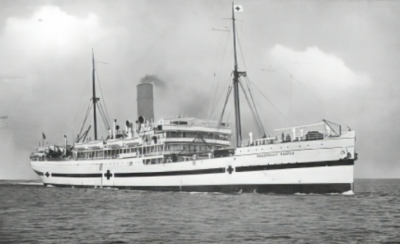
The poet Rupert Brooke was on HMHS Grantully Castle three months ago on his way to fight in the Dardanelles. He developed gastroenteritis and septicaemia and was transferred to French hospital ship Duguay-Trouin shortly before his death in Greece on 23rd April, aged 27.
The Langholm Red Cross Hospital was inspected by Surgeon-General George Bourke; Major Wilson, RAMC; General Sir Geoffrey Barton, KCB; and Dr Maxwell Ross. All gave their full approval of the hospital’s arrangements.
Monday 19th July
Mr W Grant, a linguist from Aberdeen and convenor of the Scottish Dialects Committee, visited Langholm last week in search of gramophone records with recordings of vanishing Scottish language. He was given some good examples and Rev George Orr is now appealing for people to notify Miss Fraser at Langholm Academy of any local words that are falling into disuse.
Christopher Grieve [later Hugh MacDiarmid] attended his younger brother Andrew’s marriage to Cecilia Rhodes in Dumfermline. Andrew is senior clerk to the surveyor of taxes in Cupar, Fife.
Thursday 22nd July
The town council approved the handing over of the town standard for the Common Riding, against the votes of Thomas Easton and James[?] Harkness. Provost Easton declined a request to present the standard and the celebration was approved to be under the patronage of the ‘town council’ rather than the usual ‘provost, magistrates and councillors of the burgh’.
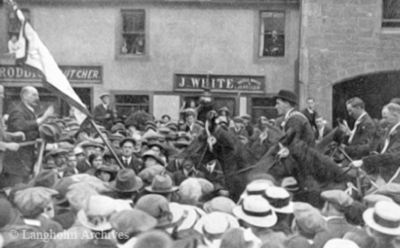
Friday 23rd July
A telegram was received from Major Bell from Gibraltar saying that he was on his way home, expecting to arrive at Southampton on Tuesday.
The Comforts Committee met in the Town Hall, chaired by Miss Smith, Terrona. She explained that ‘comforts’ meant items not provided by the government, sent in parcels that would cheer the recipients by reminding them that people at home were thinking of them. Cash donations from the town’s residents are being collected monthly. A list of donors is published monthly but the amounts will no longer be specified, after some objections.
Monday 26th July
The Parish Council held its annual meeting, Charles Paisley, tanner, presiding, and provided estimates of costs for the current financial year.
[Table of costs]
To meet these costs, it set rates as follows, the same level as last year:
[Table of rates]
Tuesday 27 July
Major Bell is now in a convalescent home for officers in London. Thomas Roddick is being treated in Devonport for deafness. Richard Beattie is in Malta with stomach problems and James Armstrong is also in Malta, with dysentery.
There was a good attendance of wool buyers at the summer fair. Cheviot wool sold for around 40 shillings per stone of 24 pounds compared to around 24 shillings last year.
The Town Band gave a performance in the High Street, after which a modest crowd proceeded to Station Gate to welcome returning natives on the last train. The flute band, consisting only of drums, a triangle and two flutes, decided that their presence was insufficient to play.
The Common Riding will take place tomorrow on the basis of the following programme:
[Programme]
Wednesday 28th July
The Common Riding took place in generally fair weather. The flute band started the day at 5.30 am with only one more member than last night, followed by an unofficial hound trail with four dogs.
A silver-topped stick was presented by Bailie Cairns to Andrew Johnstone, cornet fifty years ago when he was a spinner. Johnstone was also fair crier from 1884 to 1898.

Bailie Cairns handed the town standard to Cornet Wilson, after which the Town Band and the cornet led a procession through the town, with only 21 horsemen compared to well over 100 last year.
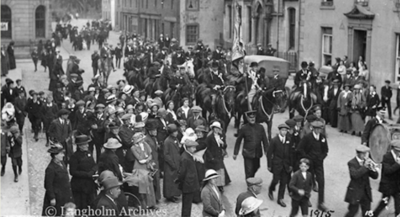
Christopher ‘Kirst’ Elliot stood on a horse’s back for the first part of the traditional proclamation, the ‘crying of the fair’.
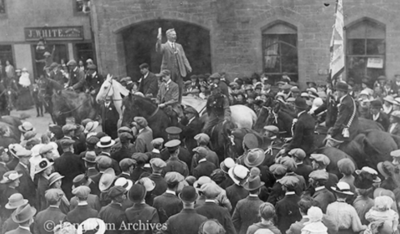
The horsemen ascended the steep incline from Market Place without the usual gallop. At Castle Craigs, Private Gavin Irving, Canadian Highlanders, cried the fair, dressed in military uniform. On returning to the town, the group was joined by 470 children and proceeded round the town with four emblems: a heather-decked spade, a barley bannock (bread) with a salted herring, a large thistle and a decorative crown.
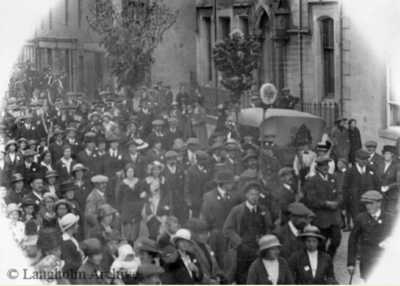
Kit Elliot stood on horseback again for the next part of the proclamation, after which the horsemen crossed the Ewes Water and sods of earth were cut in traditional places.
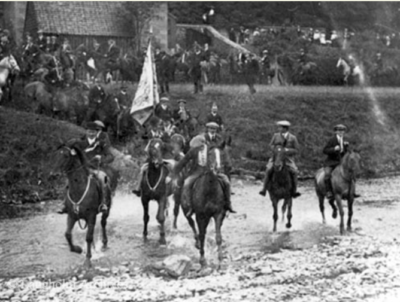
The flag was returned to Bailie Cairns on the steps of the Town Hall, unusually at mid-day instead of at the end of the evening, and Rev Buchanan said a few words including a message to the troops.
Thursday 29th July
The Duke of Buccleuch wrote somewhat cryptically to Arthur Bell from Montagu House, London, after Eleanor Bell’s suicide and Major Bell’s wounding in the Dardanelles:
Dear Mr Bell
I am exceedingly sorry that I inflicted my letter upon you and hope it did not add to your anxieties; it is really monstrous that people should spread false rumours.
I hope you will find your son fairly well and that his wounds are not very serious but I fear the shock of hearing of his loss will come very heavy on him but seeing you will be a great comfort to him. I feel very much for him in his sad homecoming.
[Yours?] [illegible]
Buccleuch
The letter arrived in an envelope with black edges, a form of ‘mourning stationery’, addressed in the Duke’s handwriting to ‘Arthur Bell Esq / Hillside / Langholm’.